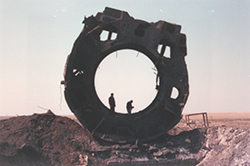

The Stanley Center works with diverse stakeholders to preserve, adapt, and re-envision policy solutions that help states prevent the use of nuclear weapons.
Unless states work to establish, renew, and reinvent habits of cooperation and restraint, the world could face nuclear crises that are more frequent, faster-paced, and even less manageable.
The danger of nuclear weapons is more salient today than it has been in a generation. Security and political relationships among potential nuclear adversaries are worsening. Many of the treaties, institutions, and cooperative arrangements that helped keep the nuclear threat at bay have atrophied, lapsed, or been dismantled. The challenges are growing more complex as states develop and apply emerging technologies in ways that intensify risks to international peace and security.
The Stanley Center works to advance practical solutions to reduce those risks. We approach this work with a strong belief in the value of cooperative security and stakeholder inclusion.
Any use of nuclear weapons would make a secure and enduring peace impossible. Since our inception in 1956, we have worked to promote nuclear disarmament and advance policies that help prevent the use of nuclear weapons. We carry forward that work today with the belief that stakeholders of all types must be part of governance efforts in a rapidly changing world.
Our work brings together experts at all levels—from national governments, international governance institutions, non-governmental organizations, research and academia, and the private sector—to identify, generate, develop, and advance innovative approaches to reducing nuclear risks.
Risk reduction has a history of success over the last sixty years. We help build on the promise of those existing measures by seeking ways to enhance them, strengthen constituencies for them, and encourage their consideration by new stakeholders and in regional contexts.
Today’s political and technological environments demand creative approaches to risk reduction. To help states succeed in preventing the use of nuclear weapons, we advocate for risk reduction measures that can operate in a multipolar world, account for nonstate actors, and keep pace with technology development.
To meet today’s challenges, risk reduction solutions will need to involve more stakeholders in their design, implementation, and monitoring. To increase confidence in and support for these measures, we look to include more stakeholders in the process of risk reduction—through technical and political cooperation and by involving stakeholders from non-nuclear weapons states and civil society.
Follow our unfolding conversations
Nuclear Weapons
It’s More Than a StoryNuclear Weapons
Public Open Source Analysis and Intelligence: Practice, Terminology, and Ethical ConsiderationsSee new and ongoing collaborations
October 30, 2023 - November 2, 2023 | Nuclear Weapons
Adventures in Nuclear Risk ReductionJune 27-29, 2023 | Nuclear Weapons
Exploratory Workshop on Auditing Risk ReductionNovember 1-3, 2022 | Nuclear Weapons
Nuclear Adventures Adventures in Nuclear Risk Reduction aims to facilitate intergenerational knowledge transfer by publishing stories in a variety of formats on first-person experiences with risk reduction and elevating them for discussion between practitioners and early or mid-career experts. Visit the project website to explore the stories in our series, including experiences shared by Bill Moon, Siegfried Hecker, Laura Rockwood, Tom Countryman, Cheryl Rofer, Scott Roecker, and others.
Adventures in Nuclear Risk Reduction aims to facilitate intergenerational knowledge transfer by publishing stories in a variety of formats on first-person experiences with risk reduction and elevating them for discussion between practitioners and early or mid-career experts. Visit the project website to explore the stories in our series, including experiences shared by Bill Moon, Siegfried Hecker, Laura Rockwood, Tom Countryman, Cheryl Rofer, Scott Roecker, and others.
At the Stanley Center for Peace and Security, we believe that diverse perspectives create better solutions. With the Accelerator Initiative, we are applying that value to our work on nuclear weapons policy by creating career development opportunities for early-career women working in nuclear, international security, or technology policy.
Follow us on Twitter (@StanleyConnect) or contact a member of our team working to avoid the use of nuclear weapons.